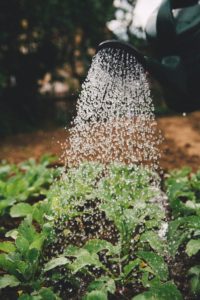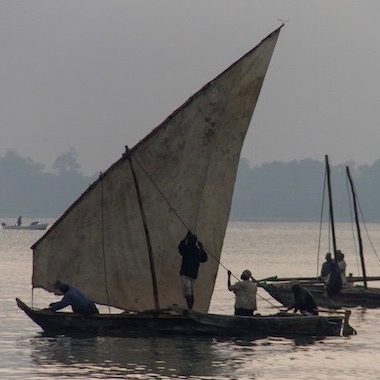Nurturing sustainable agricultural and water transitions: scaling pathways to desired futures
Agriculture is a paradox – both critical for sustaining humanity and, as practiced in many places, damaging to the ecological systems that support human wellbeing (e.g., Ringler, 2021). Much research has focused on transitions toward sustainability in agricultural systems from industrial models to smallholder farms (Tilman et al., 2002; Foley et al., 2011; Liverpool-Tassie et al, 2020). This research has been diverse in its entry points, from individual adoption of best management practices (e.g., Prokopy et al., 2019; Villamayor-Tomas et al., 2019) to transformations of production systems to organic and regenerative models (Shahmohamadloo et al., 2021; Bossio et al., 2021). Agriculture and water are highly coupled and, we argue, benefit from being considered together in the context of desired futures. Sustainable agricultural transitions must address the impacts of crop production on water scarcity and quality in the context of hydroclimatic events, including droughts and floods. Although a growing body of literature considers the nexus of food and water (Liu et al., 2018), the perspectives of important actors and the impacts of agricultural markets have often been neglected or marginalised.
We see the focus of this working group as highly aligned with PECS’ broad aim in that we are focused on the stewardship of social-ecological systems (specifically agriculture and water; impacts of markets) and the relationship to human wellbeing and inequality in particular (marginalized actors, intergenerational perspectives). We further emphasize the need for a transition to sustainable futures in the focus on finding pathways to desired futures among diverse contexts with the goal to scale up from case studies to cross-case learnings.
Key research question:
- What are potential pathways that support sustainable agricultural and water transitions, addressing underexplored factors including the missing perspectives and experiences of marginalized actors, the influence of agricultural markets across scales, and intergenerational justice?
Working Group Coordinators:
- Julia Baird – Brock University Ontario, Canada
- Catherine Febria – University of Windsor, Canada
Working Group Participants:
- Dustin Garrick – University of Waterloo, Canada
- Daniel Teodoro – Delft University of Technology, The Netherlands)
Note: This group of participants will grow over the coming months
Literature:
Bossio D., Obersteiner M., Wironen M., Jung M., Wood S., Folberth C., Boucher T., Alleway H., Simons R., Bucien K., Dowell L., Cleary D., Jones., R. (2021). Foodscapes: Toward Food System Transition, The Nature Conservancy, International Institute for Applied Systems Analysis, and SYTEMIQ, ISBN: 978-0-578 31122-7
Foley, J. A., Ramankutty, N., Brauman, K. A., Cassidy, E. S., Gerber, J. S., Johnston, M., … & Zaks, D. P. (2011). Solutions for a cultivated planet. Nature, 478(7369), 337-342.
Liu, J., Hull, V., Godfray, H.C.J., Tilman, D., Gleick, P., Hoff, H., Pahl-Wostl, C., Xu, Z., Chung, M.G., Sun, J. and Li, S., (2018). Nexus approaches to global sustainable development. Nature Sustainability, 1(9): 466-476
Liverpool-Tasie, L., A. Wineman, S. Young, J. Tambo, C. Vargas, T. Reardon, G. Adjognon, J. Porciello, N. Gathoni, L. Bizikova, A. Gaile, and A. Celestin. (2020). A scoping review of market links between value chain actors and small-scale producers in developing regions. Nature Sustainability 3(October): 799–808.
Prokopy, L. S., Floress, K., Arbuckle, J. G., Church, S. P., Eanes, F. R., Gao, Y., … & Singh, A. S. (2019). Adoption of agricultural conservation practices in the United States: Evidence from 35 years of quantitative literature. Journal of Soil and Water Conservation, 74(5), 520-534.
Ringler, C. (2021). From torrents to trickles: Irrigation’s future in Africa and Asia. Annual Review of Resource Economics, 13: 157-176.
Shahmohamadloo, R. S., Febria, C. M., Fraser, E. D., & Sibley, P. K. (2021). The sustainable agriculture imperative: A perspective on the need for an agrosystem approach to meet the United Nations Sustainable Development Goals by 2030. Integrated Environmental Assessment and Management, https://doi.org/10.1002/ieam.4558
Tilman, D., Cassman, K. G., Matson, P. A., Naylor, R., & Polasky, S. (2002). Agricultural sustainability and intensive production practices. Nature, 418(6898), 671-677.
Villamayor-Tomas, S., Sagebiel, J., & Olschewski, R. (2019). Bringing the neighbors in: A choice experiment on the influence of coordination and social norms on farmers’ willingness to accept agro- environmental schemes across Europe. Land Use Policy, 84: 200-215.




